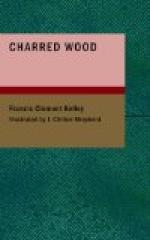Again Mark hesitated. “It’s to ask about Miss Atheson.”
Father Murray’s eyes smiled. “I thought so,” he said. “What do you want to know?”
Mark hesitated. “I know that the lady is very charitable and kind, but especially so to anyone whom you suggest. You must, therefore, be interested in anything that concerns her.”
“I am,” said Father Murray. “Very much interested.”
Mark thought he noticed a new and half-suspicious note in the priest’s voice, and was distressed. He felt like blaming himself for having mentioned the subject. He feared he had lost ground with his new-made friend; but, having started the discussion, Mark was determined to go through with it.
“It’s just this way, Father,” he said. “I think you ought to know that there is someone besides yourself interested in Miss Atheson. The incident she mentioned yesterday seemed a small one, but—well, I had to move pretty quick to keep that man from making himself obnoxious. He had a photograph in his hand and was determined to see her face in order to make comparisons. Incidentally, the constable was with him.”
Mark, watching closely to note the effect of his words, saw the face before him whiten.
“The constable with him?”
“And I am confident that the other man is a detective. I feel sure he thinks Miss Atheson is someone he has been commissioned to find. And they evidently think that I am in the matter to defend the lady. This morning I left some papers in the safety deposit vault at the First National, and as I passed the bank a little while ago I saw the constable talking to the cashier—about me, judging from their confusion as they acknowledged my greeting through the window. My room was searched this morning. They didn’t find anything, though.” Mark laughed as he thought how disappointed Saunders must have been.
“I hope you will pardon me, Mr. Griffin,” said Father Murray, “if I confine myself for the present to asking questions. Have you ever noticed the camp of Slavic laborers about a mile east of Killimaga—along the line of the new railway?”
“I have passed it several times.”
“Did you by chance notice,” Father Murray went on, “whether this detective looked like a Slav?”
“On the contrary, he is—” Mark half paused, then hurried on—“an American.” It was not necessary that he mention Saunders’ name—not now, at least.
Father Murray seemed puzzled. “There are two or three educated men in that camp,” he said, “who have been hanging around Killimaga a great deal of late; and they have been worrying an old parishioner of mine—a retired farmer who finds plenty of time to worry about everybody else, since he has no worries of his own. He thinks that these well-dressed ‘bosses’ are strange residents for a railroad construction camp. He tells me that he has often been in such camps, but that he had never seen what he calls ‘gintlemen’ living in them before.”




